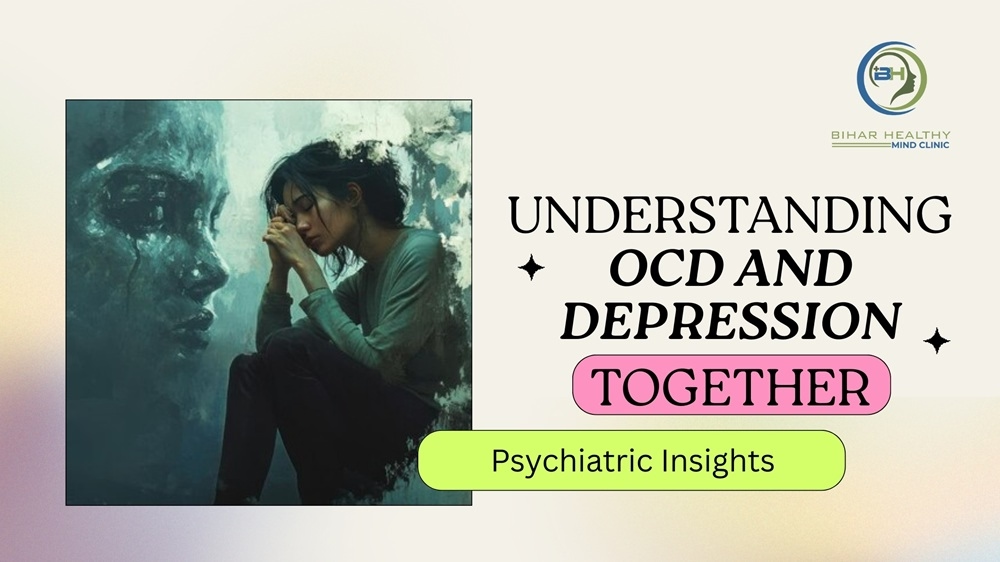
Mental health conditions are often interconnected, making them more difficult to recognize and manage. Among the most common areas of overlap in psychiatry is the connection between OCD and depression. While these two disorders are diagnosed separately, they frequently co-exist, creating a cycle of intrusive thoughts, compulsive behaviors, and persistent sadness that greatly affects an individual’s quality of life.
At Patna Psychiatry, people dealing with these challenges receive expert care from Dr. Saurabh Kumar, MD (Psychiatry), who is acknowledged as the Best psychiatrist in Patna. Understanding how OCD depression develops, how it presents, and how it can be treated is vital for individuals and families seeking clarity and support.
What Exactly Is OCD?
Obsessive-Compulsive Disorder (OCD) goes far beyond simply liking cleanliness or organization, it is a significant mental health disorder.
-
People with OCD experience two main features:
- Obsessions: These consist of persistent, involuntary thoughts, images, or urges that repeatedly enter the mind. Common examples include fears of contamination, doubts about whether a door is locked, or disturbing mental images that a person cannot control.
- Compulsions: These are repetitive actions or rituals performed to reduce the anxiety caused by obsessions. This might include repeated handwashing, checking appliances over and over, or arranging objects until they “feel right”.
Although these behaviors may temporarily reduce distress, they ultimately reinforce the cycle of anxiety. Over time, OCD can consume hours of a person’s day and cause severe emotional and physical exhaustion.
What Exactly Is Depression?
Depression, clinically known as Major Depressive Disorder (MDD), is one of the most common mental health conditions worldwide. It is not limited to occasional sadness; rather, it involves prolonged and overwhelming feelings of despair that interfere with daily life.
-
Key symptoms of depression include:
- A constant feeling of sadness, emptiness, or hopelessness
- Loss of interest in hobbies or activities once enjoyed
- Disturbances in sleep and appetite
- Low energy and fatigue, even after rest
- Difficulty concentrating or making decisions
- Thoughts of worthlessness or guilt
- In severe cases, thoughts of self-harm or suicide
Depression impacts not only the mind but also physical health, making it essential to seek timely treatment.
Why Do OCD and Depression Often Occur Together?
The link between OCD and depression is complex, but highly significant. Many individuals living with OCD find themselves developing depressive symptoms over time. This is because the repetitive cycle of obsessions and compulsions often creates frustration, hopelessness, and isolation.
-
Several factors explain this overlap:
- Shared Biological Pathways: Both OCD and depression involve irregularities in neurotransmitters such as serotonin. This indicates that both disorders may share common neurological pathways.
- Chronic Stress: Constantly fighting intrusive thoughts and engaging in rituals can be exhausting, eventually leading to feelings of despair and depression.
- Functional Impairment: OCD can interfere with work, studies, and relationships. When these areas of life suffer, depression often follows.
- Negative Thinking Patterns: Both conditions fuel self-criticism, guilt, and helplessness, making them mutually reinforcing.
Studies suggest that up to half of individuals diagnosed with OCD may also experience a depressive episode in their lifetime.
Recognizing OCD Depression
When OCD and depression co-occur, the symptoms can blend in a way that makes diagnosis challenging.
-
Common signs include:
- Obsessions and compulsions paired with constant low mood
- A sense of hopelessness about ever controlling OCD behaviors
- Fatigue from both compulsive rituals and depressive withdrawal
- Withdrawal from social life due to embarrassment or lack of motivation
- Intrusive thoughts linked to self-harm or despair
Recognizing these overlapping signs is crucial so that treatment can address both conditions effectively.
Treatment Approaches for OCD and Depression
At Patna Psychiatry, treatment plans are tailored to each individual, ensuring that both disorders are addressed together.
- Evidence-based strategies include:
- Comprehensive Assessment - A psychiatrist carefully evaluates symptoms, medical history, and lifestyle factors to identify both OCD and depression accurately.
- Medication - Selective Serotonin Reuptake Inhibitors (SSRIs) are commonly prescribed since they are effective in reducing symptoms of both OCD and depression. In more severe cases, medication combinations may be required.
- Psychotherapy
- Cognitive-Behavioral Therapy (CBT) enables people to recognize and restructure harmful patterns of thought.
- Exposure and Response Prevention (ERP) is widely recognized as the primary therapy for OCD, helping patients progressively manage and decrease compulsive behaviors.
- Interpersonal Therapy (IPT) or supportive therapy can help with the relational challenges caused by depression.
- Lifestyle Changes - Incorporating healthy routines, regular physical activity, adequate sleep, and mindfulness practices can improve treatment outcomes.
- Family and Community Support - When family members are involved in therapy, they can provide encouragement, reduce stigma, and support recovery.
Why Professional Help Matters
The coexistence of OCD and depression can be overwhelming, but effective treatment is possible. Attempting to manage these conditions without medical guidance may worsen symptoms. Consulting the Best psychiatrist in Patna, such as Dr. Saurabh Kumar at Patna Psychiatry, ensures access to evidence-based treatment, compassionate care, and personalized recovery plans.
Professional help provides patients with the tools to break the cycle of intrusive thoughts, compulsions, and depressive emotions, allowing them to regain control over their lives.
Conclusion
OCD depression is a challenging combination, but it is not insurmountable. By understanding the connection between these two conditions, individuals and families can take informed steps toward recovery. With psychiatric care, therapy, and support, people struggling with OCD and depression can find relief and improve their quality of life.
At Patna Psychiatry, the focus is on empowering patients through expert psychiatric care, innovative treatment methods, and compassionate support. Recovery may take time, but with the right guidance, it is absolutely possible.
Disclaimer: All characters and events depicted in this blog are entirely fictional. Any resemblance to actual persons, living or dead, is purely coincidental. The content is intended for informational purposes only and should not be considered as medical advice. Always consult a qualified healthcare professional for medical concerns.
Visitors: 78





No comments yet.